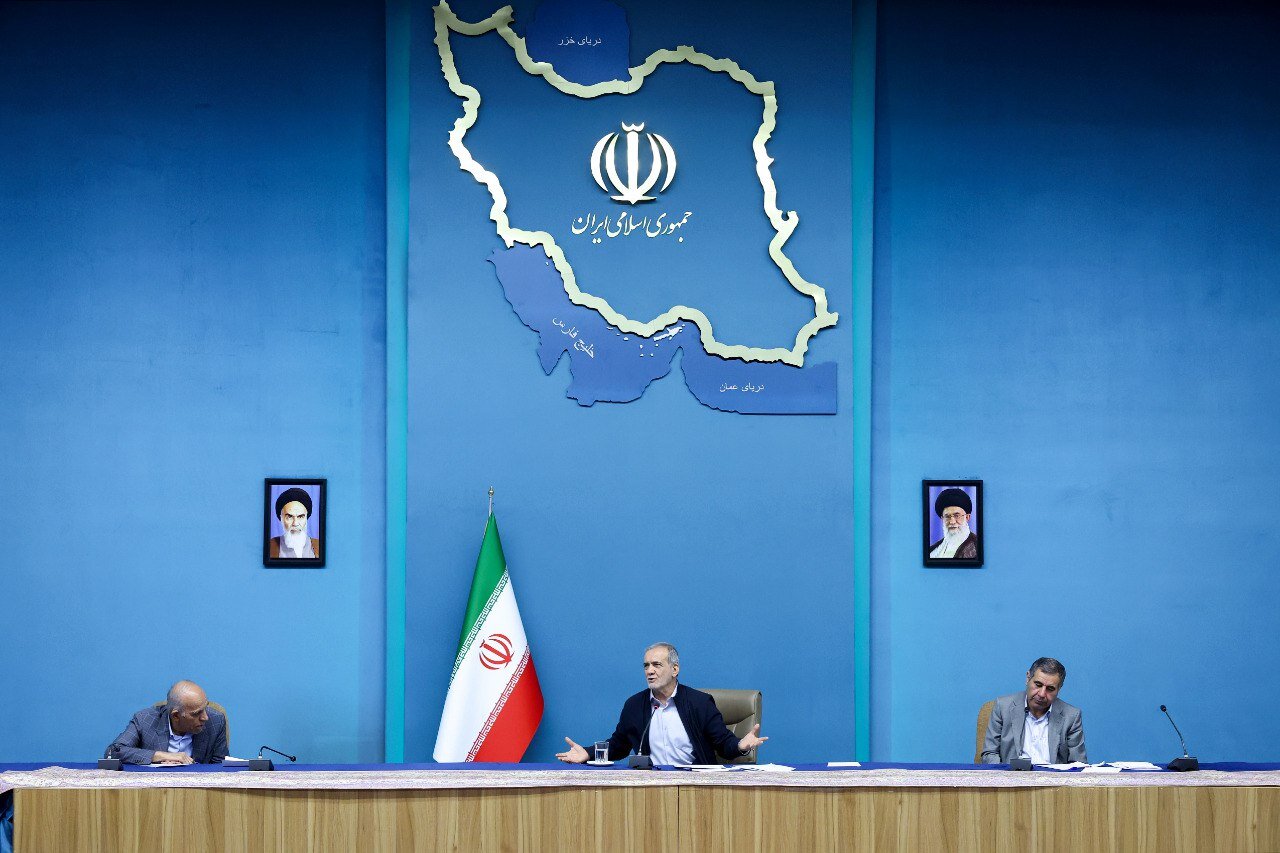Pezeshkian: U.S. must prove commitment to genuine negotiations

TEHRAN – As calls for fresh nuclear negotiations resound in Western capitals, Iranian President Masoud Pezeshkian has issued a stark reminder: diplomacy does not equate to surrender, and trust cannot be restored through intimidation.
“We believe in negotiations,” he stated firmly, “but not at any price. We are not seeking war…, or nuclear weapons. We seek dialogue—but the Americans must also prove they seek it too.”
The message, delivered at a Sunday evening gathering with political and grassroots leaders, went beyond rhetoric. It captured the essence of Iran’s position in the face of relentless U.S. pressure and posturing.
“How can we negotiate with a country that applies maximum pressure and threatens us on a daily basis?” Pezeshkian asked, pointing to Washington’s track record of broken commitments and economic warfare. “We speak with the world, we speak with our neighbors, and we’ve improved those relations. But the U.S. is a different story.”
At the heart of Pezeshkian’s comment lies a deep frustration felt by the Iranian leadership—that even with Tehran's flexibility, restraint, and willingness to engage, it continually faces sanctions, pressure, and threats.
Pezeshkian reiterated Iran’s principled position, saying: "We interact with the world with respect, and we seek no conflict. However, we will never tolerate humiliation. We are not seeking a bomb, and we've communicated that repeatedly. Our peaceful motives are also supported by a religious ruling from the Leader of the Islamic Revolution.”
In the mid-1990s, Ayatollah Ali Khamenei issued a fatwa prohibiting the production, stockpiling, and use of weapons of mass destruction, including nuclear weapons.
A record of compliance met with betrayal
Iran's doubts about the United States stem from its historical experiences. Following the signing of the Joint Comprehensive Plan of Action (JCPOA) in 2015, Iran fully complied with its commitments. This was validated through 15 regular reports from the International Atomic Energy Agency (IAEA), which repeatedly confirmed that Iran fulfilled the deal's conditions.
Nevertheless, in May 2018, the United States, under President Donald Trump, unilaterally withdrew from the JCPOA and reintroduced a sweeping sanctions regime. This action not only violated international norms but also went against UN Security Council Resolution 2231, which endorsed the agreement.
The European signatories to the agreement—namely France, Germany, and the UK—voiced regret but ultimately failed to shield Iran from the consequences of Washington’s withdrawal.
In reply, and in accordance with Articles 26 and 36 of the JCPOA, Iran progressively diminished its obligations in a transparent and reversible way. Tehran consistently asserted that complete adherence could recommence if sanctions were removed and solid assurances were given against future violations.
Despite the repeated setbacks, Iran has kept diplomatic channels open. The high-level discussions with the E3 in Geneva and with China in Beijing demonstrate Tehran’s continued dedication to diplomatic efforts. Iranian officials have reiterated their readiness to reach a reliable and lasting agreement—one that includes the full lifting of sanctions and verifiable safeguards against future non-compliance, especially by Washington.
However, the U.S. continues to undermine trust with provocative rhetoric. In addition to constant threats, the U.S. keeps issuing new sanctions against Iran. Just recently, on April 1st, the U.S. Treasury said in a statement last Tuesday that its Office of Foreign Assets Control (OFAC), in coordination with the Department of Justice, had taken actions against three individuals and six companies based in Iran, the United Arab Emirates (UAE) and China for their alleged role in the procurement of unmanned aerial vehicle (UAV) components to an Iranian drones manufacturer.
Iran’s skepticism toward the U.S. is not limited to the JCPOA. From the 1953 CIA-pushed coup against Prime Minister Mohammad Mossadegh to the downing of Iran Air Flight 655 in 1988, Tehran's apprehensions stem from decades of historical resentment.
Even outside Iran, Washington’s history of abandoning significant international accords—like the Paris Climate Accord which was decided by Trump on January 20, 2025, shortly after his second inauguration.
In contrast, Iran has consistently demonstrated its willingness to engage in dialogue. Its involvement in global frameworks, ongoing collaboration with the IAEA, and constructive regional diplomacy demonstrate that Tehran is open to dialogue—but only when it is based on respect, not pressure.
Pezeshkian’s message is clear: Iran is willing to discuss, but not to surrender. The Islamic Republic will reject any agreement that doesn't include protections or permits future treachery. If Washington genuinely values diplomacy, it needs to restore trust via tangible, verifiable measures—not by making threats.
Until then, Iran insists, the door to diplomacy remains open—but it cannot walk through it alone or under duress.
Leave a Comment